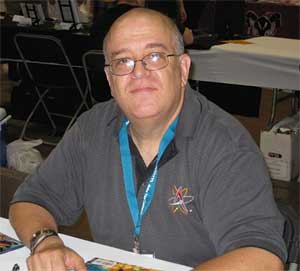- Solzhenitsyn has kicked the bucket, traveling to that great gulag in the sky. That is, if you believe in that stuff. I’ll give him “One Day” and Cancer Ward to some extent, but I never quite took to Archipelago. Thought Gulag was turgid stuff that preached to the converted. (Explain yourself at length! Well, maybe one day.) Then again, I’m one of those odd readers who looks to the text, rather than an author’s miserable experience, for merit. The biggest upset here is that nobody thought to book Solzhenitsyn and Elie Wiesel for some demented pay-per-view boxing match.
- Warren Ellis on the reality of SF magazines. Much of this, I suspect, has to do with the graying of science fiction fans. Or rather the graying of austere acolytes hostile to emerging voices and pining for hard science fiction the way that the rest of us look for a grand cross between Kierkegaard and a roller coaster. Don’t worry. The dour codgers will die off eventually, their unsmiling lips tarnished with talcum and a mortician’s assiduous cover. Unfortunately, Ellis is right. There are few ebullient pubs that will pick up the slack in print. Maybe if Gordon Van Gelder submits to disemvoweling, there might be some hope for tomorrow’s speculative Coovers, if only by accident.
- Nicholson Baker has written a delightful essay about obsession with the OED!
- What the hell? Ed’s writing something positive about the New York Times? Yes indeed. And I should also point out that I absolutely loved the theme for Sunday’s crossword too! I mean, that kind of wordplay takes an adept hand, depth and wit, if I do say so myself.
- Aside from John Leonard’s pardon in Harper’s, it appears that Matthew Price is one of the few critics to get Thirlwell.
- And Michael Martone has some damn interesting thoughts on blogs.
Author / Edward Champion
An Actual McCain Ad. Seriously.
Sunny, Mid-Thirties, with a Chance of Showers
Details on the Save Segundo campaign will be announced here very soon. In the meantime, there is this matter of advancing one’s chronological meter. (Many happy returns to The Other Ed too, who shares the day in question! Today, the Literary Eds will conquer the world! Tomorrow, we’ll all just go back to being taxpayers.)
The Bat Segundo Show: Mike Edison
Mike Edison appeared on The Bat Segundo Show #226. Edison is the author of I Have Fun Everywhere I Go.
Condition of the Show: Reinvestigating the purported death of Bat Segundo. (See also Show #199.)
Author: Mike Edison
Subjects Discussed: Writing a memoir predicated upon shit-talking, sticking with the details, the lack of composite characters, compressed chronology, Heeb editor Josh Neuman vs. Screw art director Kevin Hein, Tom Cruise’s ass, The Passion of the Christ, the ground rules for satire, Martha Stewart, being married to ideas, High Times‘s Steven Hager, reality TV vs. YouTube, patience and publishing, the Chronocaster, Tommy Chong, attempting to assemble the film High Times Potluck, marijuana bribes, the cult of personality, sexual harassment, being in the gutter with Al Goldstein, the roots of High Times, editorial backstabbing, the appropriate conditions in which to get stoned, Robert Altman, stoners and color separation, Ozzy Osbourne, Edison’s career trajectory, working for a beer and soft drinks magazine, dropping out of Columbia and working as a porn novelist and getting burned out, on being bored easily, the business of High Times, magazine readership, early ambitions, Bill Hicks, the Beatles and John Lennon’s Plastic Ono Band, Ringo Starr’s first album vs. Steve Miller, and the unpredictability of life.
EXCERPT FROM SHOW:
Correspondent: First off, you have a lot of critical things to say about a lot of people.
Edison: I name names, brother!
Correspondent: Yeah, I know. But there’s a lot of shit-talking going on.
Edison: You think?
Correspondent: And I’m wondering if this book was written out of revenge or what?
Edison: Absolutely not. I mean, you know, I feel sorry for the people who weren’t nice to me in the last twenty years of my career. But, no, this was not written from a point of view of malice. That’s not a place to write a book from. The book’s a celebration. And, of course, a few people crossed me over the years and I do kind of take joy in sticking pins in them now. I’d be lying if I didn’t say that there weren’t. But success is the best revenge. And history is written by the winners.
Correspondent: You consider yourself a success? You’re writing your own history here?
Edison: I’m on your radio show. I think there’s no greater sign of success than that.
Correspondent: (laughs)
Download BSS #226: Mike Edison (MP3)
Listen: Play in new window | Download
The Bat Segundo Show: Peter David
Peter David appeared on The Bat Segundo Show #225. He is most recently the author of Tigerheart and the Incredible Hulk novelization.
Condition of the Show: Investigating claimed nemeses of Goliath.
Author: Peter David
Subjects Discussed: On being prolific, producing work quickly, writing stories set in expansive universe, reacting to a universal construct, working with mythos, the Fallen Angel universe, the Star Trek: New Frontier books, Joseph Campbell and Star Wars, Willow, fundamental tropes in storytelling, whether or not all stories are derivative, retinkering the Peter Pan formula for Tigerheart, the advantages of pastiche, James Barrie, Don Quixote, the Great Ormond Street Childrens Hospital’s litigious actions towards Peter Pan adaptations, emulating Barrie’s voice, the unproducable nature of Barrie’s Peter Pan play, the advantages of dream narratives, the conversational nature of the comic book script medium, cameo appearances and throwaway side characters in Tigerheart, verisimilitude, managing numerous characters in a universe, story elements that originate from the protagonist, speculative double entendres to George Bush, adjusting comic storylines as sales figures come in, spicing things up in Fallen Angel, keeping a comic book marketable and other commercial demands, David’s twelve-year run on the Hulk, boosting sales, the role of the comic book editor, David’s exclusive Marvel contract, Tennessee Williams, unique stories and salable stories, and coordinating storylines on other comic books.
EXCERPT FROM SHOW:
 Correspondent: I’m wondering though if there has ever been an instance in your comic career, in which an editor has come to you and said, “Hey, Peter, the sales for this particular title are flagging. What can we do to raise things up?” Has this ever an influence?
Correspondent: I’m wondering though if there has ever been an instance in your comic career, in which an editor has come to you and said, “Hey, Peter, the sales for this particular title are flagging. What can we do to raise things up?” Has this ever an influence?
David: Sure. Of course it’s an influence. I mean, look, when it comes to — particularly my work-for-hire material — my job at the end of the day is to do two things. As far as the publisher is concerned. This is purely my job as far as the publisher is concerned, okay? Number one: Turn in a publishable script. And number two: Do everything that is within my power to write a book that will sell. Okay? Because I could turn in absolutely kickass scripts that aren’t going to sell for crap. But I feel to a certain degree that part of my job is to try and do everything I can to keep the book marketable. I’ve been doing that my entire comic book career. When I was writing Hulk, during my initial twelve-year run, I regularly had access to sales figures ahead of time. Three, four months ahead of time. Because that’s how far ahead we were soliciting. And they were incredibly instructional. Because what would happen is, I would be aware of a sales drop months ahead of time. Months ahead of time. So that I would have the Hulk in a particular incarnation going through a particular series of events. If I saw sales starting to flag, I’d say to myself, “Okay. That incarnation of the Hulk seems to be running its course. Time to come up with something else.”
So if you want to have an idea of when sales were starting to drop during my twelve-year run, at any particular time, look to a point where the Hulk undergoes some kind of transformation, backdate yourself about six months and that’s when I was looking at the sales figures, going, “Okay. We have a drop.” The problem nowadays is that we don’t know sales figures until after the book is already on the stands. So instead of having a three to four month early warning system, so that I can course correct ahead of time, we are always behind the curve by three to four months. Because we don’t know the sales numbers until at least two months after the book has come out. I mean, you know, we see the sales numbers on ICv2 or whatever it is. That’s when I see the sales numbers. We see those sales numbers come out two to three months after the book is on the stands, plus we’re soliciting three months down the line. So you can find yourself in free-fall before you’re aware of the fact that you’ve got any kind of attrition problem. Because every book’s always going to have attrition. Every book. Every book. There’s no stopping it. There’s always going to be. You’re going to get a build. And then it’s going to level off. And then it’s going to start to drop. Always. No matter what the book is. Always. The thing I was able to do on Hulk is, when I saw it start to drop, I would say, “Okay. Time to do something different.” And I could come up with a new angle on The Hulk that would boost sales. Because we’d have people going, “Oh, they’re doing something new and different with The Hulk? Let’s see.” As it is, I can’t course correct. And it’s incredibly frustrating.
Correspondent: But I’m also wondering if some of the stuff that you do with, say, Fallen Angel — I mean, you had a post on your blog recently in which a gentleman couldn’t purchase it from his neighborhood comic store. Because he was the only person purchasing the issue.
David: Buying it, yeah.
Correspondent: So for something like this, is Fallen Angel more of an unfettered territory to write in?
David: It’s unfettered territory. But that doesn’t mean that I don’t want to see sales be brought up.
Download BSS #225: Peter David (MP3)
Listen: Play in new window | Download

